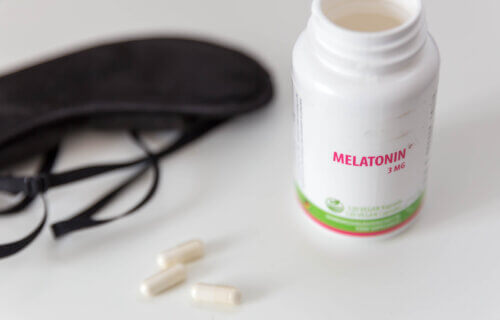SÃO PAULO, Brazil — Melatonin is a naturally occurring hormone produced by the human body in response to darkness that helps regulate our sleep-wake cycles. In other words, melatonin tips off our brains that it’s bedtime. Of course, sleep is often incredibly elusive, and many people boost their natural melatonin levels with over-the-counter supplements. However, new findings from Brazil suggest taking melatonin supplements can aggravate pre-existing intestinal disorders such as Crohn’s disease and ulcerative colitis.
Study authors examined a group of lab mice, discovering that depending on each rodent’s gut microbiota profile, melatonin appeared capable of worsening inflammation of the intestine and impairing the action of the gut microbiota.
The gut microbiota, or gut flora, is an essential community of bacteria and other microbes vital to good health, proper digestion, and a robust immune system. When someone has an imbalance of unhealthy and healthy microbes in the intestines, it can contribute to weight gain, high blood sugar, abnormal cholesterol levels, and other disorders.
“It’s generally thought to be harmless. After all, it’s a hormone and can help regulate sleep. However, our study shows that people should be careful about taking hormone supplements and that the ingestion of melatonin supplement can have adverse effects on health,” says Cristina Ribeiro de Barros Cardoso, a professor of immunology and neuroimmunoendocrinology at the University of São Paulo’s Ribeirão Preto School of Pharmaceutical Sciences (FCFRP-USP), in a media release.
Intestinal disorders can lead to several painful side-effects
Cardoso’s laboratory focuses on research pertaining to inflammatory bowel disorders like Crohn’s disease and ulcerative colitis. These conditions are immune-mediated, meaning they stem from abnormal activity among immune cells while overreacting to a pathogen, which can ultimately result in destructive effects on the gut microbiome and severe clinical symptoms including abdominal pain, constant diarrhea, bleeding, and fatigue.
Current treatments include either suppressing or inhibiting immune responses in order to lower the excessive inflammation that can damage intestines. Besides corticosteroids and immunosuppressants, treatments may also include immunobiological medications, considered more effective for both moderate and severe cases. However, these treatments can be expensive and unaffordable for most people. For example, in Brazil, such meds are only covered under specific circumstances by the SUS (Sistema Único de Saúde, the national health service in Brazil) or by health plans mandated by a court order.

“Our lab works to achieve a better understanding of these diseases and propose novel treatments that are more affordable,” explains Prof. Cardoso, who holds a degree in dentistry from the Federal University of Uberlândia (Minas Gerais state) and a PhD in basic and applied immunology from USP, with a postdoctoral internship at Forsyth Institute, an affiliate of the Harvard School of Dental Medicine.
Besides the issue of affordability, Prof. Cardoso says many patients simply don’t respond well to the most advanced treatments and thus must undergo surgery to remove parts of their intestine. Such invasive procedures, of course, can extract a heavy toll health-wise on the patient and their quality of life after the procedure.
“For this reason, in recent years we have pursued novel therapeutic options, primarily based on immune response modulation or regulation,” the professor notes.
Scientists warn supplements are still drugs
Prof. Cardoso and her team have spent years conducting hormone research, but recently began focusing on melatonin specifically.
“Look, I’m not saying by any means that melatonin doesn’t have beneficial effects. On the contrary, in fact. There are few studies or reports pointing to adverse side effects,” she adds.
To be clear, there’s no denying melatonin can act as an antioxidant and improve several physiological or pathological conditions.
“We started out in this study with the assumption that we might be able to develop a novel treatment for Crohn’s disease and ulcerative colitis, but to our surprise, we found exactly the opposite, and patients should be made aware of this danger,” the researcher continues.
This project involved an experiment in which scientists induced colitis in a group of mice, who they then treated with melatonin. The animals’ conditions became worse instead of improving after receiving melatonin.
“It’s important to stress that no human patients were involved in the study. The animals’ bowel inflammation became much, much worse,” Prof. Cardoso comments. “We then began trying to understand why. We found that melatonin had a positive effect on the disease if the effect on gut microbiota was ignored and the mice were treated with wide-spectrum antibiotics to eliminate all the bacteria.”
It appears the negative effects of melatonin depend on the bacteria present in a person’s intestine and also have an association with inflammatory diseases of the region. Certain gut microbiota features seem to increase inflammation and disrupt the immune system in response to melatonin, ultimately damaging the digestive system.
“What is the meaning of all this? I’d say it’s that all that glitters is not gold. We should take great care with medications, hormone supplements or hormones offered as food supplements. You buy a ‘food supplement’ in a pharmacy and think it’s not a drug, it won’t alter anything in your body, it will only do good because after all it’s sold as a food supplement, but it’s not really that at all. It’s a hormone, and regulation of the interaction between all hormones and the immune system is very delicate,” Prof. Cardoso concludes.
You might also be interested in:
- Sleep better naturally: Using a weighted blanket increases melatonin, reduces stress
- Melatonin supplements may lower a child’s risk of self-harm, suicide
- Smart toilet can spot warning signs for bowel diseases by listening to you pass gas
The study is published in the journal Microorganisms.


The inflammatory response from melatonin is dependant on the composition of the gut bacteria.
“In conclusion, despite the fact that MLT (melatonin) could play a protective role in specific conditions of inflammation, we still should be cautious regarding its wide use to treat IBD, since hormone supplementation may exacerbate the inflammatory responses, DEPENDING ON THE HOSTS AND ON THE GUT MICROBIOTA HARBORED BY THEM.”